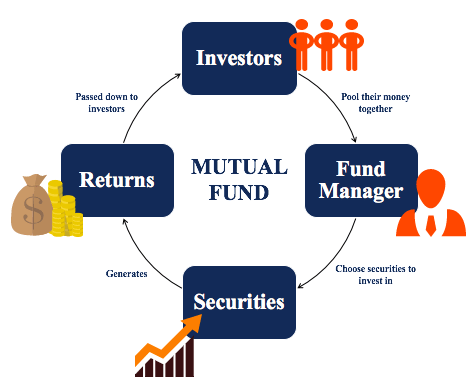For individuals wanting to build their wealth over a long period, mutual funds can be the most important ingredient to their investment plan. It’s one of the most popular investment avenues in today’s dynamic and fast-evolving markets.
Mutual Funds can help investors in virtually entering the equity market with a hands-off approach. There is a wide range of Mutual Funds available in the market, each one having diverse specifications to meet your requirements.

Whether you simply have questions about how mutual funds work, or you’re ready to develop a personalized mutual fund portfolio, At divadhvik, you’ll enjoy access to a wide array of funds, foundation to build powerful and diversified portfolios, interactive planning tools as well as professional advice for Mutual Funds that’s available any time. Whenever you plan invest in Mutual Funds, you’ll find the advice and guidance you need to help you reach your investment goals. Investing your money in mutual funds with divadhvik can help move you closer to funding the dreams in your life.
Mutual Fund Fundamentals:
Definition:- A mutual fund is an investment that pools money from many individuals and invests it according to the fund’s stated objectives. Professional money managers make investment decisions on behalf of fund investors, buying and selling investments such as money market investments, bonds and stocks
Structure of Mutual Funds:
In India, mutual funds function as trust created under the Indian Trust Act, 1882. There are three layers of mutual fund in India. (i) Sponsors (ii) Trustee and (iii) Asset Management Company. Sponsors work as Promoters of the company. They take responsibility of starting mutual fund business. Sponsors contribute initial capital (40% of net worth of AMC) and appoint Trustees and Board of Trustees. Board of Trustees act as guardians of investors and ensure that money invested by investors is used according to the objective of the scheme. Asset Management Company is the public face of fund management business. Sponsors and Trustees together form AMC and appoint Fund Manager. Fund manager with help of fund management team makes all investment decisions.
How safe is investing in Mutual Funds?
In India mutual funds function as trusts. The sponsor of the fund appoints Board of Trustees who act as guardians of investor’s money. The board or Trustee Company, as an independent body acts as the protector of the unit holder’s money. These trustees ensure that investor’s interest is safeguarded and that the AMC’s operations and Fund Manager’s actions are along the professional lines. To ensure independence of Board of Trustees, SEBI mandates a minimum of two-third independent directors on the board of Trustee Company.
Apart from Trustees, the entire mutual fund industry functions under the preview of SEBI. This structure and stringent guidance make investing in mutual funds safe and easy. Fund Managers also have to function within the broad framework and rules & regulations designed by AMC.
Investing in Mutual Fund: Mutual funds are considered as favorable investment vehicle for individual investors particularly for investors who have limited resources available in terms of capital and ability to carry out their investment decisions.
Benefits of Investing through Mutual Funds:

For an investor mutual fund offer wide range of benefits.
Some of the key benefits include:-
- Portfolio Diversification:- Mutual funds are a convenient and affordable way of gaining access to a wide range of investments that would be very difficult and time-consuming to purchase and manage individually. Because mutual funds typically hold 50 to 100 different investments, they offer a degree of diversification that would be difficult to achieve on your own.
- Professional management: Actively managed mutual funds also give you the benefit of professional investment management. The investments are selected by experienced professionals who devote themselves exclusively to tracking the markets, analyzing investments, and implementing a consistent investment strategy.
- Flexibility to meet your needs and goals: A wide range of mutual funds are available to help meet the needs of every type of investor, from conservative to very aggressive. Mutual funds can also help you meet a variety of investment goals, from establishing an emergency fund to saving for a vacation, retirement, or education.
- Convenient Administration: Investing in a Mutual Fund reduces paperwork and helps you avoid many problems such as bad deliveries, delayed payments, and unnecessary follow-up with brokers and companies. Mutual Funds save your time and make investing easy and convenient.
- Return Potential: Over a medium to long term, Mutual Funds have the potential to provide a higher return as they invest in a diversified basket of selected securities.
- Low Costs: Mutual Funds are a relatively less expensive way to invest compared to directly investing in the capital markets because the benefits of scale in brokerage, custodial, and other fees translate into lower costs for investors.
- Liquidity: In open-ended schemes, you can get your money back promptly at AssetValue (NAV) related prices from the Mutual Fund itself. With close-ended schemes, you can sell your units on a stock exchange at the prevailing market price or avail of the facility of repurchase through Mutual Funds at NAV-related prices which some close-ended and interval schemes offer you periodically.
- Transparency: You get regular information on the value of your investment in addition to disclosure on the specific investments made by your scheme, the proportion invested in each class of assets, and the fund manager’s investment strategy and outlook.
- Flexibility: Through features such as Systematic Investment Plans (SIP), Systematic Withdrawal Plans (SWP), and dividend reinvestment plans, you can systematically invest or withdraw funds according to your needs and convenience.
- Choice of Schemes: Mutual Funds offer a variety of schemes to suit your varying needs over a lifetime.
- Well Regulated: All Mutual Funds are registered with SEBI and they function within the provisions of strict regulations designed to protect the interests of investors. The operations of Mutual Funds are regularly monitored by SEBI.


